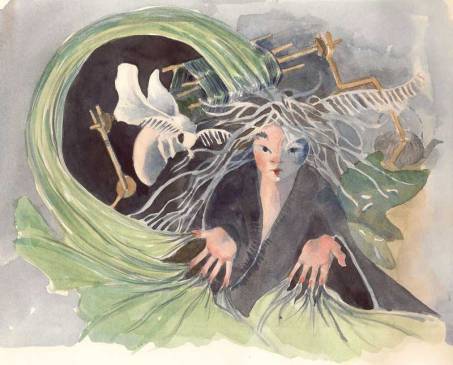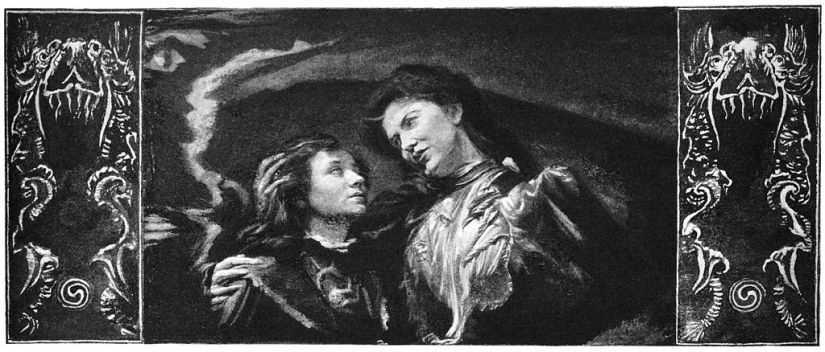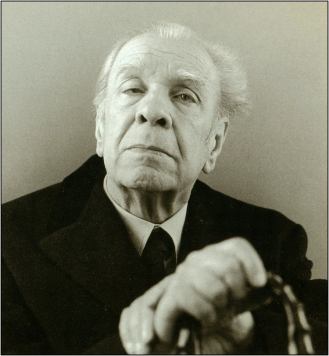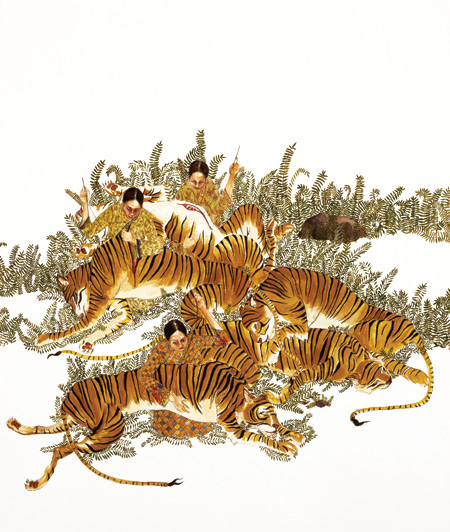
If you’re reading about dragons, chances are, you’re reading fantasy. But if you’re reading about women ascending bodily to heaven, you’re probably reading magic realism, or what New York Times reviewer Joy Williams calls “the new uncanny.”
Confused? You’re not alone. The most common definition of fantasy is “literature in which magical things occur” or, as the Routledge Dictionary of Literary Terms defines it, literature which creates its own coherently organized worlds and myths” (82).
Of course, magical things happen in both fantasy and magic realism, so that doesn’t help us. I’ve heard people say that the big difference is that in fantasy, the characters are amazed, stunned and shocked by the magical events, as when the glass suddenly disappears at the zoo in Harry Potter, and everyone screams. In magic realism, by contrast, the characters react to the magical as though it is ordinary.
Complicating both these definitions is the fact that the concept of reality is culturally defined. Orthodox Christians consider God and the Bible real. Atheists consider both fantasy. Roman mythology was at one time was considered real; now the word myth is synonymous with lie. Native American writers such as Leslie Marmon Silko write about things that most Caucasian Americans would call unreal, but which are very real to her.

Gabriel García Márquez, the king of magic realism and author of the Nobel Prize winning 100 Years of Solitude, said, “Fantasy has nothing to do with the reality of the world we live in; it is purely fantastic invention, an inspiration, and certainly a diversion ill-advised in the arts” (quoted in Kroeber 130).
However, anyone who has heard a woman screaming in the forest and followed the sound into the mouth of a mountain lion will find the origins of fantasy very real. The flicker we all get in the peripheral vision, and secrets our parents tried to keep but which we all felt, is where ghosts come from. The amygdala is a crude but lightning fast instrument. So I have to respectfully disagree with the king.
I think the best way to consider the difference between fantasy and reality is to consider its impact on the reader. Tsvetan Todorov, a literary theorist famous for his treatment of the fantastic, said that magic realism disrupts the reader’s sense of reality whereas fantasy creates another completely enclosed reality. Whereas fantasy “imposes absolute closure” and “implies complicity on the part of the readers,” the literary fantastic seeks reader hesitancy” (Armitt 7). The story begins in the “real world” and when something unreal happens, and the reader is never sure if the cause is supernatural or natural, such as a psychotic break or a drug induced hallucination (Armitt 8).

According to this definition, Henry James’ The Turn of the Screw is an example of the literary fantastic: did the governess see a ghost or hallucinate it? Did the ghost kill the boy, or did she scare him to death? The movie Pan’s Labyrinth is likewise an example: Is she alive or dead at the end? Did imagination save her or kill her?
However, this definition doesn’t work for the poster child of magic realism, 100 Years of Solitude. No one doubts that Remedios the Beauty ascended bodily to heaven and that a man’s blood flowed out the front door, down the block, turned left and went into his mother’s house. As Lucy Armitt says in her book, Fantasy Fiction: An Introduction, there are no “competing readings of the text… revolving around two choices, the psychological or the supernatural” (Armitt 8).

However, you do feel ill at ease in Jorge Luis Borge’s short stories. In “The Garden of Forking Paths,” you aren’t even sure that anything magical happens, it’s just an incredible coincidence that a spy randomly walks into the house of a man who has been studying his ancestor’s life work. Is Borges just a bad writer, you find yourself wondering. Is this even a story?
That’s why you also need this other defining characteristic of magic realism to understand it. Jon Evans says magic realism “draws from the well” of political disruption, violence and chaos, where the “surreal becomes normal and the insane becomes rational.”
Magic realism is often the intersection of culturally competing definitions of reality, and that creates an inherent tension. In the case of 100 Years, it’s the intersection of indigenous and Catholic culture. This is the kind of tension you find in Toni Morrison’s Beloved (the tension between White and Black culture) and Leslie Marmon Silko’s Ceremony (the tension between Native American and White culture), even Karen Russel’s story, “Reeling for the Empire,” about Japanese women sold into slavery and turned into human silk worms by poisoned tea (the tension between the rich and poor).

I’m not sure how I explain why I would put Aimee Bender and Amber Sparks in the category of magic realism rather than fantasy, especially as Bender has representatives of both in the same collection. Perhaps it comes down to a third distinguishing characteristic.
In fantasy, the magic is orderly and even predictable, rules apply. In contrast –and this is why I prefer it–mystery lies at its heart of magic realism. We don’t really know why the tigers come out of the forests with split skins, patiently waiting to be sewn back together by two sisters in Aimee Bender’s “Tiger Mending,” but the trope shimmers in our minds like an image on water, hard to grasp, unforgettable, and necessary.

So I’d say a pretty good, all-inclusive definition of magic realism is: literature which causes the reader to experience tension between competing views of reality, which is most often derived from violent political and cultural clashes, in which magical things occur, often with no clear explanation, and to which the characters in the story are often oddly accustomed.
Armitt, Lucie. Fantasy Fiction: An Introduction. New York: Continuum International Publishing Group, 2005.
Bender, Aimee. The Color Master. New York: Doubleday, 2013.
Childs, Peter and Roger Fowler. Routledge Dictionary of Literary Terms. Routledge, Taylor and Francis Group, 2006.
Evans, Jon. “Magic Realism: Not Fantasy. Sorry.” Tor.com. Tor Books. 23 October 2008. Web. 12 March 2014.
Kroeber, Karl. Romantic Fantasy and Science Fiction. New Haven: Yale University Press, 1988.
Le Guin, Ursula K. “The Critics, The Monsters and the Fantasists.” The Secret History of Fantasy. Ed. Peter S. Beagle. San Francisco: Tachyan Publications, 2010. 355-366.
Pan’s Labyrinth. Dir. Guillermo del Toro. Perf. Ivana Baquero, Ariadna Gil, Sergi López. Warner Brothers, 2006. Film.
Russell, Karen. Vampires in the Lemon Grove. New York: Knopf, 2013.
“Thursday, March 6, 2014.” The Writer’s Almanac with Garrison Keillor. American Public Media, 6 March, 2014. Web. March 12, 2014.
Williams, Joy. “The New Uncanny: ‘Vampires in the Lemon Grove’ by Karen Russell.” The New York Times Sunday Book Review. Feb. 7, 2013.

El Gabo would have been in awe at your description of Magic Realism, Lale. He also would have been honored to have had someone like you be ” respectufully in disagreement” with him. MUch love. Pilar.
LikeLike
Thank you Pilar. You shame me! 🙂
LikeLike
interesting. Seems like it would be a good article for one of the writing magazines. M
>
LikeLike
A brilliant post. I guess the origins of the fantastic can be traced back to man’s numenous (as in relating to Numen) experiences. The rather scary example of the woman-eating lion you mention can be such an experience, but so can so many more…
LikeLike
Thank you! Sorry I didn’t notice the comment until lo these many months later.
LikeLiked by 1 person
No worries 🙂
LikeLike
I came across this while researching for a class. http://www.writing-world.com/sf/realism.shtml
LikeLike
Thank you for providing the link and promoting discussion! I like his definition — though I stand by my assertion that straddles more than one world in such a way that it makes the reader feel as if they can’t quite tell which world he/she… I disagree that it’s a “debased term” and with the idea that it’s now just a “marketing label and an attempt to carve out a part of the prestige readership for speculative works” – though I’ll buy that some use it that way.
LikeLike